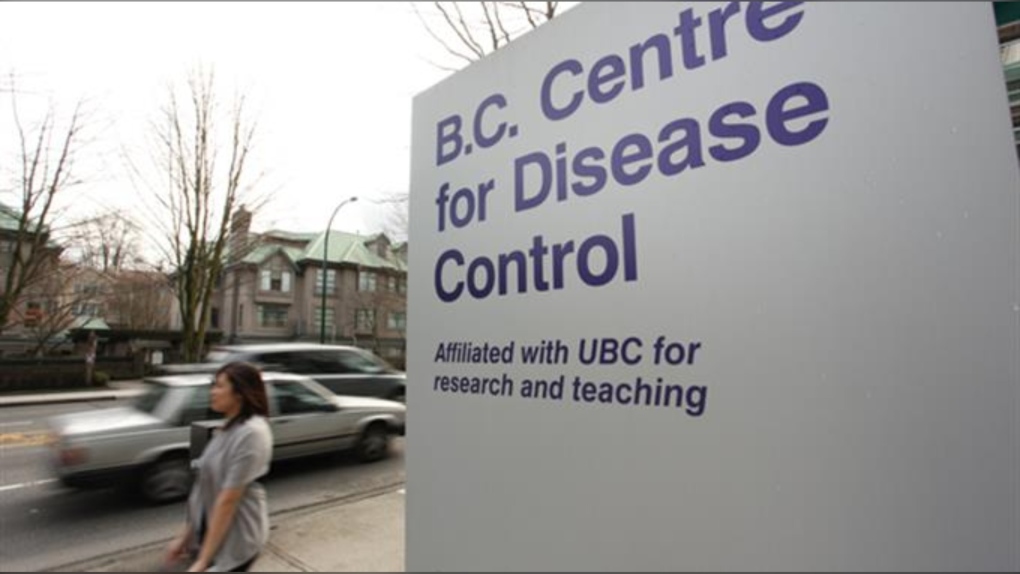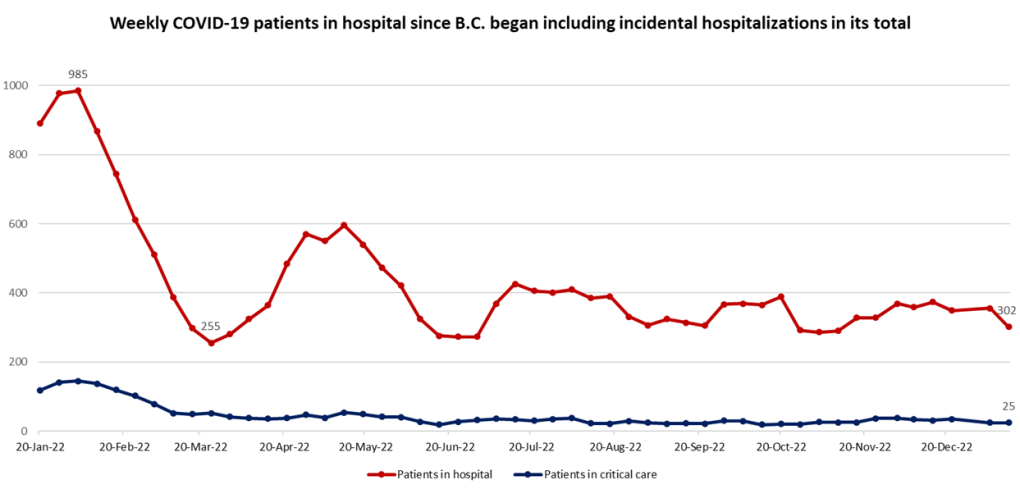B.C. COVID-19 data: Weekly update shows drop in hospital population
 A sign at the BC Centre for Disease Control is seen in this photo from the BCCDC website.
A sign at the BC Centre for Disease Control is seen in this photo from the BCCDC website.
The number of people in hospital with COVID-19 in B.C. fell to its lowest level in weeks Thursday.
There were 302 test-positive patients in hospitals across the province, the lowest total seen since Nov. 10, and a roughly 15-per-cent drop from the 356 recorded last week.
 The number of patients with COVID-19 in B.C. hospitals on Thursdays since July 2022 is shown. (CTV)
The number of patients with COVID-19 in B.C. hospitals on Thursdays since July 2022 is shown. (CTV)
Weekly hospitalization totals released by the B.C. Centre for Disease Control include both those who have serious cases of COVID-19 requiring medical treatment and those who are admitted to hospital for other reasons and test positive incidentally.
Health officials estimate that, at any given time, between 40 and 50 per cent of current COVID-related hospitalizations are caused by the disease, while the rest are incidental.
Since the province began counting hospitalizations using this "hospital census" model in January 2022, there have been as many as 985 and as few as 255 COVID-19 patients hospitalized in B.C. on Thursdays.
Since mid-August, however, the hospital census has not gone above 400, and it has only been below 300 for a brief, three-week span in late October and early November. A graph showing the trend in the weekly hospital census from January 2022 onward can be found at the end of this article.
CASES AND TESTING
In its weekly update on Thursday, the BCCDC announced 661 new, lab-confirmed cases of COVID-19 for the period of Jan. 1 through 7.
That's a slight decrease from the preceding week, which saw 691 new infections added to the official case count, but still higher than any other week since Oct. 13.
The BCCDC's weekly case counts come with two major caveats. First, the agency only reports results from lab-based PCR tests, which are no longer available to the vast majority of B.C. residents. The results of at-home rapid antigen tests – the only kind of testing available to most residents – are not tracked.
Second, the official case count includes only the first time a person tests positive for COVID-19, meaning those who tested positive on a PCR test back in 2020 and get reinfected are not included in the weekly numbers.
These dynamics have led experts to conclude that the BCCDC's infection numbers are off by roughly 100-fold.
Roughly 15 per cent of all tests conducted in B.C. during the week of Dec. 25 to 31 – the most recent for which data is available in the BCCDC's weekly "situation report" – came back positive. That's the highest positivity rate the province has seen for publicly funded tests since mid-October.
VACCINATION DATA
According to the BCCDC's COVID-19 Dashboard, there were 32,656 new doses of COVID-19 vaccine administered during the week that ended Jan. 7.
Nearly a third of those, some 10,014 shots, were fifth doses, meaning they were administered to people who had already had their initial course of vaccine plus two booster shots.
Another 14,449 were fourth doses, leaving less than 8,200 doses that were administered to people who had had fewer than three shots already.
While 72 per cent of British Columbians ages 70 and older have had at least four doses of a COVID-19 vaccine, younger age groups have been much less likely to seek out boosters.
Fewer than half of B.C. residents under age 40 have had even a first booster shot (three doses total).
 The number of people in B.C. hospitals with COVID-19 on Thursdays since January 2022 is shown, with only the highest, lowest and most recent totals labeled. (CTV)
The number of people in B.C. hospitals with COVID-19 on Thursdays since January 2022 is shown, with only the highest, lowest and most recent totals labeled. (CTV)
CTVNews.ca Top Stories

Bird flu, measles top 2025 concerns for Canada's chief public health officer
As we enter 2025, Dr. Theresa Tam has her eye on H5N1 bird flu, an emerging virus that had its first human case in Canada this year.
Christmas shooting at Phoenix airport leaves 3 people wounded
Police are investigating a Christmas shooting at Sky Harbor Airport in Phoenix that left three people injured by gunfire.
Your kid is spending too much time on their phone. Here's what to do about it
Wondering what your teen is up to when you're not around? They are likely on YouTube, TikTok, Instagram or Snapchat, according to a new report.
6,000 inmates stage Christmas Day escape from high-security Mozambique prison
At least 6,000 inmates escaped from a high-security prison in Mozambique's capital on Christmas Day after a rebellion, the country's police chief said, as widespread post-election riots and violence continue to engulf the country.
Azerbaijan observes day of mourning for air crash victims as speculation mount about its cause
Azerbaijan on Thursday observed a nationwide day of mourning for the victims of the plane crash that killed 38 people and left all 29 survivors injured as speculation mounted about a possible cause of the disaster, with some experts saying that the airliner was damaged by Russian air defence fire.
Plush toys recalled due to choking hazard
Health Canada announced a recall on a series of plush toys due to a choking hazard. Anyone who has purchased an elephant, giraffe, lion, tiger and/or panda plush toy with an attached baby can return them to the place of purchase for a refund.
Donald Trump says he urged Wayne Gretzky to run for prime minister in Christmas visit
U.S. president-elect Donald Trump says he told Canadian hockey legend Wayne Gretzky he should run for prime minister during a Christmas visit but adds that the athlete declined interest in politics.
Prayers and tears mark 20 years since the Indian Ocean tsunami that killed some 230,000 people
People gathered in prayer and visited mass graves in Indonesia’s Aceh province on Thursday to mark 20 years since the massive Indian Ocean tsunami hit the region in one of modern history’s worst natural disasters.
New York taxi driver hits 6 pedestrians, 3 taken to hospital, police say
A taxicab hit six pedestrians in midtown Manhattan on Wednesday, police said, with three people — including a 9-year-old boy — transported to hospitals for their injuries.
































